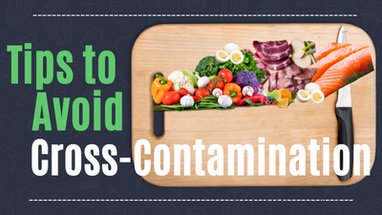Avoiding cross-contamination is one of the main safety measures that restaurants must guarantee. All kitchen professionals must know how to handle food without exposing them to the risk of cross-contamination.
What is cross contamination and how does it occur?
It is the process in which cooked or uncooked foods come in contact with others without having been cooked together, so they end up contaminated by the exchange of substances. This process can be direct or indirect.
In direct contamination, cooked foods come in contact with uncooked foods and contaminate each other. In the case of indirect contamination, it occurs when kitchen utensils are contaminated and encounter all types of food (cooked or not).
Tips to avoid cross contamination
Know the foods with the highest risk: the foods that should be paid the most attention to are raw and fresh products. In meat and fish, pathogens can be eliminated simply by being cooked and separated from the raw ones. In the case of fruits and vegetables, wash them well with water and it will be enough.

Hand cleaning: All employees must wash their hands before and after, eating, taking a break, and cooking, especially when handling any kind of meat or fish. Also, remember to clean your hands after going to the bathroom.
• Utensils and containers: Do not use the same kitchen utensils for handling cooked and raw food and remember to wash them thoroughly before using them.

Manage of cutting boards: These, like utensils, are the main food contaminants. Many of these boards can be used, by mistake, mixing their uses. If you allocate a board for different types of use, you could avoid this problem. A good idea is to assign acolor for each type of food.
Storage: When storing food in the fridge, remember to separate it as much as possible. To do this, assign specific places for each type of food, raw, fresh, and cooked. Place fruits, fish, meats, and vegetables in different bags and, finally, store the meat in airtight containers so that the blood does not reach other food. Try to place it in the lower part of the refrigerator, to avoid dripping.
Kitchen cleaning and disinfection: Always clean with disinfectant, applying it to all kitchen surfaces where food is handled.
Special care with eggs: Remove the remains of raw egg when you are going to serve the food. Eggs transmit a lot of cross contamination, so you must be very careful when handling it.
Prepare the salads at the end: This way you can ensure that the foods that need to be refrigerated are refrigerated until the moment they are served and are not exposed to contact with the fluids of the raw food.
Regular washing of kitchen cloths: If you use them in the kitchen to dry your hands or clean surfaces, remember to wash them well, with bleach and/or soap, as they tend to contain many microbes if they are not washed regularly.
By following these recommendations in your restaurant, you will be able to guarantee the safety of your employees and customers, since it will be very difficult for cross-contamination to occur in your kitchen.





